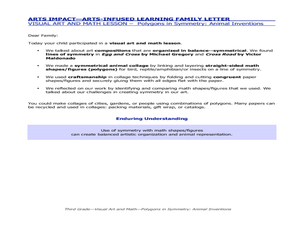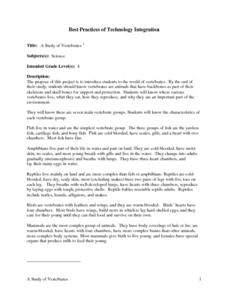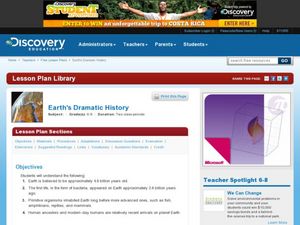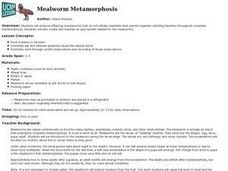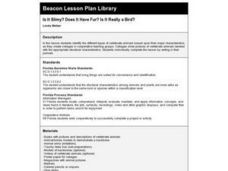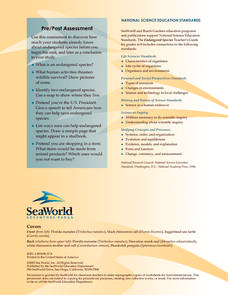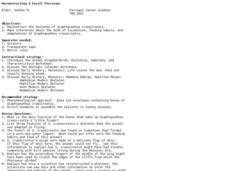Curated OER
Heating and Cooling a Really Large Lizard
Remind your middle school scientists how fox ear size varies depending on the climate they live in; large ears allow heat loss while small ears keep heat in. Discuss how a cold-blooded animal might try to regulate body temperature. Then...
Curated OER
Animals Project for German Students
Who doesn't love animals? Young learners will be excited to develop their vocabulary and categorize animals into different lists. This includes a fun extension activity that encourages the older learners to create a PowerPoint...
ARKive
Adaptations to Arid Habitats
How do plants and animals survive in habitats with very little water? Explore arid ecosystems and the way their inhabitants have adapted with a instructional activity and science experiment. After kids listen to a presentation about...
Alliance Theater
The Jungle Book Post-Show STEAM Lesson
An ecosystem is really just the flow of energy through many different living organisms. A study of Rudyard Kipling's The Jungle Book leads to an environmental science activity in which learners study how various factors can affect...
Curated OER
Estimating Turtle Size and Age
Students investigate how to estimate the age and size of turtles, and examine variability in scientific data. They read an informational handout, identify the parts of the shell, measure the shell and estimate the age, and record the...
Curated OER
Vertebrates
Fifth graders examine the traits and characteristics of vertebrates. Identifying the key factors that make the classes of vertebrates unique, they create a children's book. They decide which material is necessary to share about the...
Curated OER
An Imaginary Creature And Then Using Describing And Action Words for a Creative Writing Exercise
You have to collect lots of materials (boxes, bags, toilet paper rolls, etc.) for this lesson to work successfully. After modeling how to create an imaginary creature out of the collection of recycled materials, let your class search...
Curated OER
Prairie Mural Project
Seventh graders construct a large mural of a praire showing plants, and animals that would live there.
Curated OER
Polygons in Symmetry: Animal Inventions
Fourth graders use polygons to create animal figures with symmetry. In this polygons and symmetry lesson, 4th graders create a symmetrical animal collage by cutting and gluing geometric shapes and figures from math activities.
Curated OER
What's Your Classification
Students classify animals. In this animal groups lesson, students watch a video on animal groups and review the six animal groups. Students practice classifying animals using stuffed animals.
Curated OER
A Study of Vertebrates
Fourth graders investigate the characteristics of each vertebrate group. They take notes in a science journal, and in small groups create a HyperStudio slideshow presentation to present information about a specific vertebrate group.
Curated OER
Earth's Dramatic History
Students create a timeline. In this Earth's History lesson, students research the history of life on Earth and use the information collected to create a timeline. Students also answers the provided discussion questions.
Curated OER
Kingdom Animalia ~ A Look at the Five Major Classes
Biological taxonomy masters examine the five main classes under phylum chordata. Pupils compare and contrast the identifying characteristics of the various organisms. They explain why taxonomy is important in classifying organisms. You...
Curated OER
Mealworm Metamorphosis
Students observe offspring (mealworms) that do not initially resemble their parent organism (darkling beetles) throughout complete metamorphosis. They also create and maintain an appropriate habitat for the mealworms.
Curated OER
Creating a Classification System
Students create classification system for Arctic-dwelling animals, the Arctic hare in particular.
Curated OER
Is It Slimy? Does It Have Fur? Is It Really a Bird?
Sixth graders identify the different types of vertebrate animals based upon their major characteristics, as they create collages in groups. Collages show pictures of vertebrate animals labeled with the appropriate structural...
Curated OER
Focus on Food Chains
Third graders collect and analyze data about food chains. They conduct Internet research about the habitat of a selected organism, write a narrative, and create a computer slideshow using Kid Pix computer software that illustrates the...
Curated OER
Endangered species
Students define the following words: extinction, endangered species, meteorite collision, glaciation and climate warming. They investigate that there are 307 species on the endangered list, and an average of 10-20 species are added each...
Curated OER
Animal Alphabet
Second graders identify animals with each letter of the alphabet. In groups, they create a PowerPoint presentation which shows the information they have collected about each one. Using all of this information, they create an animal...
Curated OER
Vertebrates
Students identify and describe five main groups of the Phylum Chordata. They discover that the Phylum Chordata is the vertebrates. Students identify the main difference between invertebrates and vertebrates. They read passages about...
Curated OER
Reconstructing a Fossil Pterosaur
Students reconstruct the skeleton of the fossil Scaphognathus crassirostis. In this fossil lesson plan, students discuss the Kingdoms of life, geologic history and the history of the skeletons of species. Students are given 20 minutes to...
Curated OER
Staying Up
Students will explain the Archimedes's Principle. In this lesson on plankton, students will describe three factors that can affect the buoyancy of plankton. This lesson contains extensive background information, extensions, and multiple...
Curated OER
The Census of Marine Life
Learners explain diversity and abundance in marine life. In this oceanic biology lesson, students collect information for various geographical areas to collect a census of marine life.
Curated OER
It's the Law
Students explain various scientific laws used in SCUBA diving. In this theory based lesson, students examine and explain how temperature, density, and salinity relate to SCUBA diving using various scientific laws to engage their learning.
Other popular searches
- Reptiles and Amphibians
- Reptiles Amphibians
- Amphibians and Reptiles K 2
- Reptiles & Amphibians
- Amphibians and Reptiles K
- Reptiles Amphibians Fish
- Compare Reptiles Amphibians
- Amphibians and Reptiles Prek
- Reptiles Amphibians Birds
- Amphibians and Reptiles Unit
- Amphibians and Reptiles Perk
- Amphibians and Reptiles 3 5










